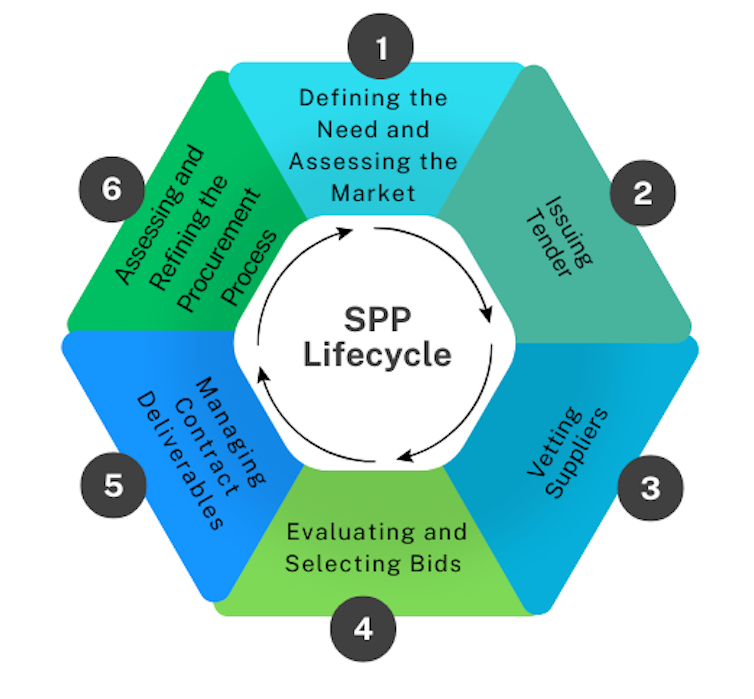AI can help the government spend billions better. But humans have to be in charge
- Written by Marta Andhov, Associate Professor, Law School & Business School, University of Auckland, Waipapa Taumata Rau
The New Zealand government spends about NZ$51.5 billion each year[1] – around 20% of GDP – on goods, services and infrastructure from third-party suppliers. It’s a lot, but how that money is spent matters as much as the amount.
Public procurement isn’t just about buying office supplies. Governments rely on it to build bridges and hospitals, source defence and medical supplies, deliver essential services, and purchase everything from cloud computing systems to renewable-energy infrastructure.
These spending decisions shape everyday life and influence social, economic and environmental outcomes. Choosing sustainable suppliers and materials can make a real difference, helping to strengthen New Zealand’s economy.
The latest Government Procurement Rules[2] now require public agencies to consider how their spending supports New Zealand’s economy in a variety of ways.
This can include adding social value, such as creating local employment or opportunities for Māori and Pasifika businesses. Or it might involve environmental benefits, such as reducing carbon emissions or choosing products designed for reuse and recycling.
But many procurement teams still find it difficult to put these goals into action because they lack time, tools or specialist knowledge. Artificial intelligence (AI) could help change that.
By automating complex tasks and analysing large amounts of data, AI can handle work that once took weeks of human effort. With Public Service Minister Judith Collins encouraging public agencies to embrace AI[3] for productivity gains, it seems likely this will extend to public procurement.
At the same time, AI is not a silver bullet. It carries unique risks and demands caution. Government institutions must protect citizens’ rights, safety, wellbeing, data privacy and security.
Big spending, big impact
Handled carefully, AI could help buyers use their purchasing power for more sustainable choices that benefit New Zealanders. But a lack of transparency and concentrated market power among a few large technology providers can lead to algorithmic bias and unfair outcomes.
In our recent research[4], we explored how AI could support sustainability throughout the procurement life cycle – and the challenges that must be managed along the way.
Public procurement is a major driver of local and global economies. Unfortunately, it can also drive climate emissions. But emissions are only part of the story.
Government purchasing also shapes social and economic outcomes: a single contract can create jobs, support local supply chains or promote fair labour standards. This makes procurement a powerful tool for economic as well as environmental sustainability.
With billions at stake, ensuring transparency, fairness and competition is essential – and complex. Adding sustainability makes it harder. Buyers must now consider not just price and quality, but also emissions, labour practices and supply-chain risks.
Yet sustainability data is often buried in countless reports, making it difficult and time consuming to assess. Many agencies simply lack the expertise or capacity to translate sustainability ambitions into day-to-day procurement decisions.
Where AI could make a difference
AI can help public buyers navigate this complexity and advance sustainability goals across the procurement cycle, from planning and tendering to contract management and performance monitoring.
At the planning stage, AI can analyse past contracts to forecast demand and identify opportunities for greener, more efficient spending – for example, replacing high-emission vehicles with low-emission fleets.
During tendering, it can verify sustainability certifications, flag suppliers with environmental or labour violations, and detect exaggerated green claims that need human review.
Once contracts are under way, AI can track supplier performance in real time, alerting agencies when sustainability targets – such as emission reductions or fair labour standards – are at risk.
A practical example is “Alice”, an AI system used in Brazil[5] to monitor government procurement. Alice scans contracts for irregularities and is reported to have saved more than US$1 million, showing how AI can improve both integrity and efficiency.

Not a plug-and-play solution
Despite its promise, AI requires strong human oversight. Algorithmic bias is a serious risk: systems trained on incomplete or skewed data can amplify inequalities, such as favouring large suppliers over small local businesses.
The Dutch child-benefits scandal[7] revealed in 2019 illustrates the danger. An algorithm wrongly flagged thousands of families, many from migrant backgrounds, for committing fraud. It had devastating personal consequences and led to the government’s resignation.
Transparency is another challenge. Many AI tools operate as “black boxes[8]”, making their decisions hard to explain or contest. In public procurement, where accountability is fundamental, this lack of visibility is unacceptable.
Finally, AI has an environmental cost of its own. Training large models consumes enormous energy. Without greener computing, AI could undermine the very sustainability goals it aims to advance.
AI has the potential to make public procurement smarter, fairer and more sustainable – but only if adopted carefully. The goal isn’t to replace human judgement but to enhance it.
Used responsibly, AI can help public buyers make better-informed choices, monitor sustainability performance and ensure every public dollar delivers benefits for people, communities and the planet.
References
- ^ NZ$51.5 billion each year (www.procurement.govt.nz)
- ^ Government Procurement Rules (www.procurement.govt.nz)
- ^ encouraging public agencies to embrace AI (www.beehive.govt.nz)
- ^ recent research (www.frontiersin.org)
- ^ AI system used in Brazil (oecd-opsi.org)
- ^ CC BY-NC-ND (creativecommons.org)
- ^ child-benefits scandal (www.politico.eu)
- ^ black boxes (www.frontiersin.org)
Authors: Marta Andhov, Associate Professor, Law School & Business School, University of Auckland, Waipapa Taumata Rau







